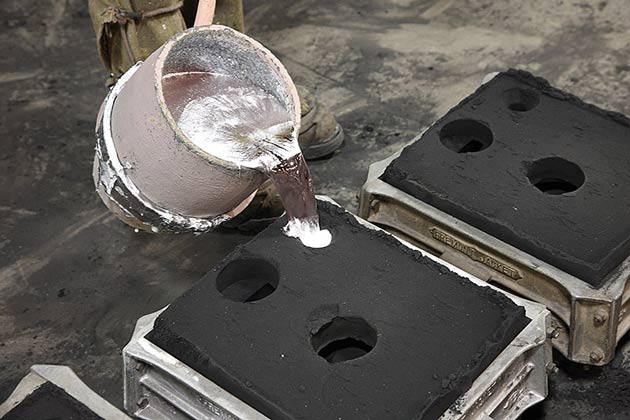The Of Stahl Specialty Company
The Of Stahl Specialty Company
Blog Article
How Stahl Specialty Company can Save You Time, Stress, and Money.
Table of Contents5 Simple Techniques For Stahl Specialty CompanyFacts About Stahl Specialty Company UncoveredLittle Known Facts About Stahl Specialty Company.Stahl Specialty Company - An OverviewLittle Known Questions About Stahl Specialty Company.
The refined difference depends on the chemical web content. Chemical Comparison of Cast Light weight aluminum Alloys Silicon promotes castability by minimizing the alloy's melting temperature and improving fluidity throughout casting. It plays an essential duty in enabling elaborate molds to be loaded precisely. Additionally, silicon adds to the alloy's strength and use resistance, making it useful in applications where sturdiness is vital, such as automobile parts and engine elements.It also enhances the machinability of the alloy, making it simpler to refine right into completed products. In this way, iron adds to the general workability of aluminum alloys. Copper boosts electrical conductivity, making it useful in electric applications. It additionally improves deterioration resistance and includes in the alloy's general toughness.
Manganese contributes to the stamina of light weight aluminum alloys and boosts workability. It is generally made use of in wrought aluminum items like sheets, extrusions, and accounts. The existence of manganese aids in the alloy's formability and resistance to splitting throughout manufacture procedures. Magnesium is a light-weight element that gives strength and effect resistance to light weight aluminum alloys.
It enables the production of light-weight components with excellent mechanical homes. Zinc boosts the castability of light weight aluminum alloys and helps control the solidification process during casting. It improves the alloy's toughness and solidity. It is commonly found in applications where elaborate shapes and fine details are needed, such as ornamental spreadings and specific automobile components.
Stahl Specialty Company - Truths
Since aluminum-silicon alloys have excellent spreading homes, high gas buildings, simple procedures, and excellent deterioration resistance, aluminum-silicon alloys are most typically made use of in the die-casting market in the house and abroad. At the exact same time, aluminum-silicon alloys are additionally fairly very early and widely acknowledged alloys developed and utilized in die-casting. After continuous research study and improvement, the majority of the existing international mainstream aluminum-silicon alloys have actually been finalized and are nothing greater than A356, A360, A380, ADC12, B390, and A413.
The key thermal conductivity, tensile stamina, return toughness, and elongation vary. Among the above alloys, A356 has the highest thermal conductivity, and A380 and ADC12 have the most affordable.

Some Of Stahl Specialty Company
In precision spreading, 6063 is appropriate for applications where complex geometries and premium surface area finishes are extremely important. Examples include telecommunication rooms, where the alloy's superior formability permits sleek and aesthetically pleasing designs while keeping architectural integrity. Similarly, in the Lighting Solutions market, precision-cast 6063 parts create elegant and efficient lights components that need intricate shapes and great thermal performance.
(https://leetcode.com/u/stahlspecialc/)
It results in a better surface area finish and better corrosion resistance in A360. Additionally, the A360 displays premium prolongation, making it perfect for facility and thin-walled components. In precision spreading applications, A360 is appropriate for markets such as Customer Electronic Devices, Telecommunication, and Power Devices. Casting Foundry. Its improved fluidity permits for complex, high-precision components like smart device coverings and communication device housings.

In accuracy spreading, aluminum 413 shines in the Customer Electronic Devices and Power Equipment sectors. This alloy's exceptional rust resistance makes it an outstanding choice for exterior applications, guaranteeing long-lasting, sturdy products in the stated industries.
Not known Details About Stahl Specialty Company
The light weight aluminum alloy you select will significantly affect both the casting process and the residential properties of the last product. Because of this, you should make your decision carefully and take an enlightened technique.
Identifying the most ideal light weight aluminum alloy for your application will certainly indicate considering a large variety of qualities. These comparative alloy characteristics follow the North American Pass Away Casting Association's standards, and we have actually split them into 2 classifications. Foundries in Missouri. The initial group addresses alloy attributes that affect the manufacturing procedure. The second covers features influencing the properties of the end product.
The alloy you select for die spreading directly impacts numerous elements of the spreading process, like exactly how easy the alloy is to work with and if it is prone to casting issues. Hot cracking, also recognized as solidification splitting, is a typical die spreading issue for light weight aluminum alloys that can result in inner or surface-level rips or splits.
Everything about Stahl Specialty Company
Particular light weight aluminum This Site alloys are a lot more prone to warm breaking than others, and your choice must consider this. An additional usual issue found in the die spreading of light weight aluminum is pass away soldering, which is when the cast sticks to the die walls and makes ejection tough. It can harm both the actors and the die, so you need to seek alloys with high anti-soldering homes.
Corrosion resistance, which is currently a remarkable feature of light weight aluminum, can differ significantly from alloy to alloy and is a necessary particular to take into consideration relying on the ecological conditions your item will be exposed to. Put on resistance is an additional property commonly looked for in aluminum items and can separate some alloys.
Report this page